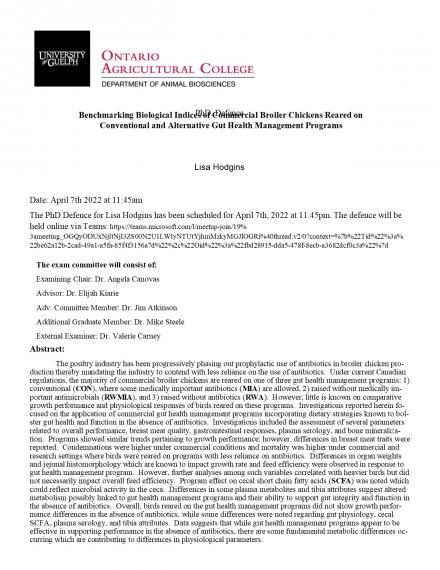Lisa Hodgin's PhD Defence
Date and Time
Location
Teams: https://teams.microsoft.com/l/meetup-join/19%3ameeting_OGQyODUxNjItNjI3ZS00N2U1LWIyNTUtYjhmMzkyMGJlOGRi%40thread.v2/0?context=%7b%22Tid%22%3a%22be62a12b-2cad-49a1-a5fa-85f4f3156a7d%22%2c%22Oid%22%3a%22fbd28915-dda5-478f-8ecb-a3682dcf0c3a%22%7d

Details
The poultry industry has been progressively phasing out prophylactic use of antibiotics in broiler chicken pro-duction thereby mandating the industry to contend with less reliance on the use of antibiotics. Under current Canadian regulations, the majority of commercial broiler chickens are reared on one of three gut health management programs: 1) conventional (CON), where some medically important antibiotics (MIA) are allowed, 2) raised without medically im-portant antimicrobials (RWMIA), and 3) raised without antibiotics (RWA). However, little is known on comparative growth performance and physiological responses of birds reared on these programs. Investigations reported herein fo-cused on the application of commercial gut health management programs incorporating dietary strategies known to bol-ster gut health and function in the absence of antibiotics. Investigations included the assessment of several parameters related to overall performance, breast meat quality, gastrointestinal responses, plasma serology, and bone mineraliza-tion. Programs showed similar trends pertaining to growth performance; however, differences in breast meat traits were reported. Condemnations were higher under commercial conditions and mortality was higher under commercial and research settings where birds were reared on programs with less reliance on antibiotics. Differences in organ weights and jejunal histomorphology which are known to impact growth rate and feed efficiency were observed in response to gut health management program. However, further analyses among such variables correlated with heavier birds but did not necessarily impact overall feed efficiency. Program effect on cecal short chain fatty acids (SCFA) was noted which could reflect microbial activity in the ceca. Differences in some plasma metabolites and tibia attributes suggest altered metabolism possibly linked to gut health management programs and their ability to support gut integrity and function in the absence of antibiotics. Overall, birds reared on the gut health management programs did not show growth perfor-mance differences in the absence of antibiotics, while some differences were noted regarding gut physiology, cecal SCFA, plasma serology, and tibia attributes. Data suggests that while gut health management programs appear to be effective in supporting performance in the absence of antibiotics, there are some fundamental metabolic differences oc-curring which are contributing to differences in physiological parameters.